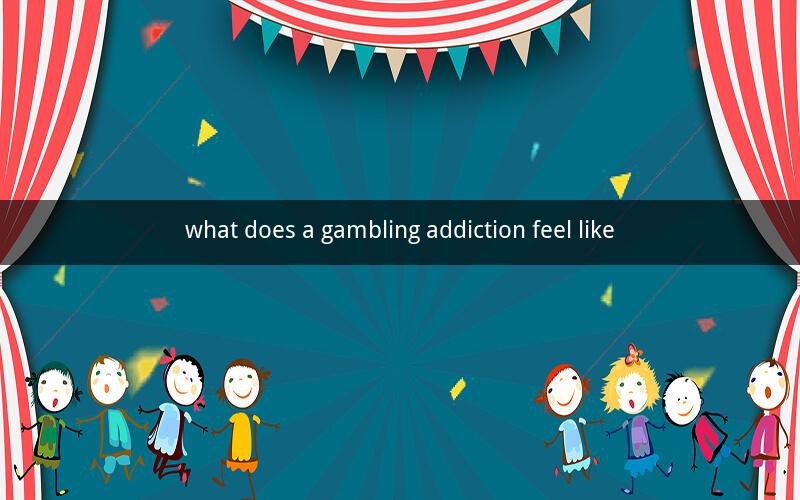
Table of Contents
1. Understanding the Concept of Gambling Addiction
2. Emotional and Psychological Symptoms
3. Physical Symptoms and Health Risks
4. Social and Relationship Impacts
5. Coping Mechanisms and Recovery
6. Professional Help and Support
7. The Role of Technology in Gambling Addiction
8. Cultural and Societal Perspectives
9. Prevention and Education
10. Personal Stories and Testimonials
1. Understanding the Concept of Gambling Addiction
Gambling addiction, often referred to as gambling disorder, is a behavioral addiction characterized by the inability to control or stop gambling despite negative consequences. It is a complex condition that affects individuals of all ages, backgrounds, and socioeconomic statuses. Understanding what it feels like to have a gambling addiction can provide insight into the struggles and challenges faced by those who are affected.
2. Emotional and Psychological Symptoms
The emotional and psychological symptoms of gambling addiction can be profound. Individuals may experience intense feelings of excitement and euphoria when gambling, often referred to as the "high" of winning. However, this is often followed by a crash, leading to feelings of guilt, shame, and despair. Common emotional symptoms include:
- Anxiety
- Depression
- Irritability
- Mood swings
- Guilt
- Shame
- Low self-esteem
- Paranoia
Psychological symptoms can manifest as a preoccupation with gambling, even when not actively engaging in the behavior. This preoccupation can lead to neglect of other important aspects of life, such as work, family, and personal health.
3. Physical Symptoms and Health Risks
Gambling addiction can also have significant physical health implications. Individuals may experience sleep disturbances, loss of appetite, and increased stress levels, which can lead to a weakened immune system. Long-term physical symptoms can include:
- Headaches
- Insomnia
- Stomachaches
- Nausea
- High blood pressure
- Heart disease
- Stroke
4. Social and Relationship Impacts
The social and relationship impacts of gambling addiction can be devastating. Relationships with family, friends, and colleagues may suffer due to the individual's preoccupation with gambling. Common social and relationship issues include:
- Financial strain
- Marital problems
- Loss of friendships
- Work-related issues
- Legal problems
5. Coping Mechanisms and Recovery
Individuals with gambling addiction may develop coping mechanisms to deal with the emotional and psychological distress. These mechanisms can include:
- Binge gambling
- Isolating oneself
- Lying to conceal the addiction
- Engaging in other risky behaviors
Recovery from gambling addiction involves identifying and addressing these coping mechanisms. Treatment may include therapy, support groups, and lifestyle changes.
6. Professional Help and Support
Professional help is crucial for individuals struggling with gambling addiction. Therapists, counselors, and addiction specialists can provide personalized treatment plans. Support groups, such as Gamblers Anonymous, offer a community of individuals who understand the challenges of addiction.
7. The Role of Technology in Gambling Addiction
The rise of online gambling has made it easier for individuals to access and engage in gambling activities. Technology plays a significant role in the development and maintenance of gambling addiction. It is essential to be aware of the potential risks associated with online gambling and to seek help if needed.
8. Cultural and Societal Perspectives
Cultural and societal perspectives on gambling addiction can vary widely. In some cultures, gambling is seen as a recreational activity, while in others, it is frowned upon. Understanding these perspectives can help individuals seek appropriate support and treatment.
9. Prevention and Education
Prevention and education are key components in addressing gambling addiction. By raising awareness about the risks and consequences of gambling, individuals can make informed decisions about their gambling behavior.
10. Personal Stories and Testimonials
Personal stories and testimonials from individuals who have overcome gambling addiction can be powerful motivators for others. These stories highlight the challenges faced and the steps taken to achieve recovery.
---
Questions and Answers
1. What are the primary emotional symptoms of gambling addiction?
- The primary emotional symptoms include anxiety, depression, irritability, mood swings, guilt, shame, and low self-esteem.
2. How can gambling addiction affect physical health?
- Gambling addiction can lead to physical symptoms such as headaches, insomnia, stomachaches, nausea, high blood pressure, and heart disease.
3. What are some social and relationship impacts of gambling addiction?
- Social and relationship impacts can include financial strain, marital problems, loss of friendships, work-related issues, and legal problems.
4. What are some coping mechanisms used by individuals with gambling addiction?
- Coping mechanisms may include binge gambling, isolating oneself, lying to conceal the addiction, and engaging in other risky behaviors.
5. How can technology contribute to gambling addiction?
- Technology can contribute to gambling addiction by making it easier to access and engage in gambling activities, often leading to increased frequency and severity of the addiction.
6. What types of professional help are available for gambling addiction?
- Professional help includes therapy, counseling, addiction specialists, and support groups like Gamblers Anonymous.
7. How can cultural and societal perspectives impact gambling addiction?
- Cultural and societal perspectives can influence the perception of gambling and the availability of support and treatment options.
8. What role does prevention and education play in addressing gambling addiction?
- Prevention and education help raise awareness about the risks and consequences of gambling, leading to informed decision-making and early intervention.
9. Can personal stories and testimonials be helpful in overcoming gambling addiction?
- Yes, personal stories and testimonials can be powerful motivators, providing insight into the challenges and the path to recovery.
10. What steps can individuals take to seek help for gambling addiction?
- Individuals can seek help by contacting therapists, counselors, addiction specialists, support groups, and by researching local resources and treatment options.